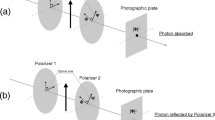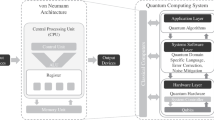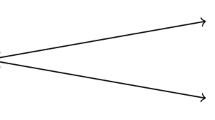Abstract
The Born’s rule introduces intrinsic randomness to the outcomes of a measurement performed on a quantum mechanical system. But, if the system is prepared in the eigenstate of an observable, then the measurement outcome of that observable is completely predictable, and hence, there is no intrinsic randomness. On the other hand, if two incompatible observables are measured (either sequentially on a particle or simultaneously on two identical copies of the particle), then uncertainty principle guarantees intrinsic randomness in the subsequent outcomes independent of the preparation state of the system. In this article, we show that this is true not only in quantum mechanics but for any no-signaling probabilistic theory. Also the minimum amount of intrinsic randomness that can be guaranteed for arbitrarily prepared state of the system is quantified by the amount of (un)certainty.
Similar content being viewed by others
References
Heisenberg, W.: Über den anschaulichen Inhalt der quantentheoretischen Kinematik und Mechanik/The Actual Content of Quantum Theoretical Kinematics and Mechanics. Z. Phys. 43, 172 (1927). (translated and repented into English) The Physical Content of Quantum Kinematics and Mechanics. In: Wheeler, J.A., Zurek W.H. (eds.) Quantum Theory of Measurement, pp. 62. Princeton University Press, N.J. (1983)
Busch, P., Shilladay, C.: Complementarity and uncertainty in Mach-Zehnder interferometry and beyond. Phys. Rep. 435, 1–31 (2006)
Busch, P., Heinonen, T., Lahti, P.: Heisenberg’s uncertainty principle. Phys. Rep. 452, 155–176 (2007)
Born, M.: Quantenmechanik der StoßBvorgänge. Z. Phys. 38, 803–827 (1926)
Born, M.: Das Adiabatenprinzip in der Quantenmechanik/The Adiabatic Principle in Quantum Mechanics. Z. Phys. 40, 167 (1926)
Oppenheim, J., Wehner, S.: The uncertainty principle determines the nonlocality of quantum mechanics. Science 330, 1072–1074 (2010)
Robertson, H.P.: The uncertainty principle. Phys. Rev. 34, 163–164 (1929)
Carruthers, P., Nieto, M.M.: Phase and angle variables in quantum mechanics. Rev. Mod. Phys. 40, 411–440 (1968)
Louisell, W.H.: Amplitude and phase uncertainty relations. Phys. Lett. 7(1), 60–61 (1963)
Bialynicki-Birula, I., Mycielski, J.: Uncertainty relations for information entropy in wave mechanics. Commun. Math. Phys. 44(2), 129–132 (1975)
Deutsch, D.: Uncertainty in quantum measurements. Phys. Rev. Lett. 50, 631–633 (1983)
Kraus, K.: Complementary observables and uncertainty relations. Phys. Rev. D 35, 3070–3075 (1987)
Maassen, H., Uffink, J.B.M.: Generalized entropic uncertainty relations. Phys. Rev. Lett. 60, 1103–1106 (1988)
Wehner, S., Winter, A.: Entropic uncertainty relations—a survey. N. J. Phys. 12, 025009 (2010)
Hardy, L.: Quantum theory from five reasonable axioms. arXiv:0101012[quant-ph] (2001)
Barrett, J.: Information processing in generalized probabilistic theories. Phys. Rev. A 75, 032304 (2007)
Barnum, H., Barrett, J., Leifer, M., Wilce, A.: Generalized no-broadcasting theorem. Phys. Rev. Lett. 99, 240501 (2007)
Barnum, H., Barrett, J., Leifer, M., Wilce, A.: Teleportation in general probabilistic theories. arXiv:0805.3553 (2008)
Barnum, H., Gaebler, C. P., Wilce, A.: Ensemble steering, weak self-duality, and the structure of probabilistic theories. arXiv:0912.5532 (2009)
Barnum, H., Wilce, A.: Information processing in convex operational theories. arXiv:0908.2352 (2009)
Barnum, H., et al.: Entropy and information causality in general probabilistic theories. New J. Phys. 12, 033024 (2010)
Chiribella, G., DArian, G.M., Perinotti, P.: Informational derivation of quantum theory. Phys. Rev. A 84, 012311 (2011)
Masanes, L., Mueller, M.P.: A derivation of quantum theory from physical requirements. New J. Phys. 13, 063001 (2011)
Pfister, C.: One simple postulate implies that every polytopic state space is classical. arXiv:1203.5622 (2012)
Pironio, S., et al.: Random numbers certified by Bell?s theorem. Nature 464, 1021 (2010)
Acin, A., Massar, S., Pironio, S.: Randomness versus nonlocality and entanglement. Phys. Rev. Lett. 108, 100402 (2012)
Koenig, R., Renner, R., Schaffner, C.: The operational meaning of min- and max-entropy. IEEE Trans. Inf. Theory 55, 4337 (2009)
Berta, M., Christandl, M., Colbeck, R., Renes, J.M., Renner, R.: The uncertainty principle in the presence of quantum memory. Nat. Phys. 6, 659–662 (2010)
Prevedel, R., Hamel, D.R., Colbeck, R., Fisher, K., Resch, K.J.: Experimental investigation of the uncertainty principle in the presence of quantum memory and its application to witnessing entanglement. Nat. Phys. 7, 757–761 (2011)
D’Arian, G.M., Manessia, F., Perinottia, P.: Spooky action-at-a-distance in general probabilistic theories. Phys. Lett. A 376, 2926–2930 (2012)
Brandenburger, A., Yanofsky, N.: A classification of hidden-variable properties. J. Phys. A 41, 42 (2008)
Bell, J.S.: On the problem of hidden variables in quantum mechanics. Rev. Mod. Phys. 38, 447–452 (1966)
Mermin, N.D.: Hidden variables and the two theorems of John Bell. Rev. Mod. Phys. 65, 803–815 (1993)
Harrigan, N., Spekkens, R.W.: Einstein, incompleteness, and the epistemic view of quantum states. Found. Phys. 40, 125–157 (2010)
Popescu, S., Rohrlich, D.: Quantum nonlocality as an axiom. Found. Phys. 24, 379–385 (1994)
Spekkens, R.W.: Evidence for the epistemic view of quantum states: A toy theory. Phys. Rev. A 75, 032110 (2007)
Benioff, P.: Possible strengthening of the interpretative rules of quantum mechanics. Phys. Rev. D 7, 3603–3609 (1973)
Benioff, P.A.: Models of Zermelo Frankel set theory as carriers for the mathematics of physics. I. J. Math. Phys. 17, 618 (1976)
Benioff, P.A.: Models of Zermelo Frankel set theory as carriers for the mathematics of physics. II. J. Math. Phys. 17, 629 (1976)
Banik, M., Gazi, M.D.R., Ghosh, S.: Degree of complementarity determines the nonlocality in quantum mechanics. Phys. Rev. A 87, 052125 (2013)
Colbeck, R., Renner, R.: Free randomness can be amplified. Nat. Phys. 8, 450–453 (2012)
Gallego, R., Masanes, L., Torre, G., Dhara, C., Aolita, L., Acin, A.: Full randomness from arbitrarily deterministic events. arXiv:1210.6514 (2012).
Knuth, D.: The Art of Computer Programming 2: Seminumerical Algorithms. Addison-Wesley, Reading, Massachusetts (1981)
Stefanov, A., Gisin, N., Guinnard, O., Guinnard, L., Zbinden, H.: Optical quantum random number generator. J. Mod. Opt 47, 595–598 (2000)
Dynes, J.F., Yuan, Z.L., Sharpe, A.W., Shields, A.J.: A high speed, postprocessing free, quantum random number generator. Appl. Phys. Lett. 93, 031109 (2008)
Atsushi, U., et al.: Fast physical random bit generation with chaotic semiconductor lasers. Nat. Photonics 2, 728–732 (2008)
Acknowledgments
We like to thank G.Kar for many simulating discussion and giving suggestions. TC thanks Council of Scientific and Industrial Research, India, for financial support through Senior Research Fellowship (Grant No. 09/093(0134)/2010). MB like to acknowledge discussion with A. Rai, Md. R. Gazi and S. Das. PP thank Council of Scientific and Industrial Research, India, for financial support.
Author information
Authors and Affiliations
Corresponding author
Rights and permissions
About this article
Cite this article
Chakraborty, T., Banik, M. & Patra, P. Uncertainty principle guarantees genuine source of intrinsic randomness. Quantum Inf Process 13, 839–848 (2014). https://doi.org/10.1007/s11128-013-0695-5
Received:
Accepted:
Published:
Issue Date:
DOI: https://doi.org/10.1007/s11128-013-0695-5




